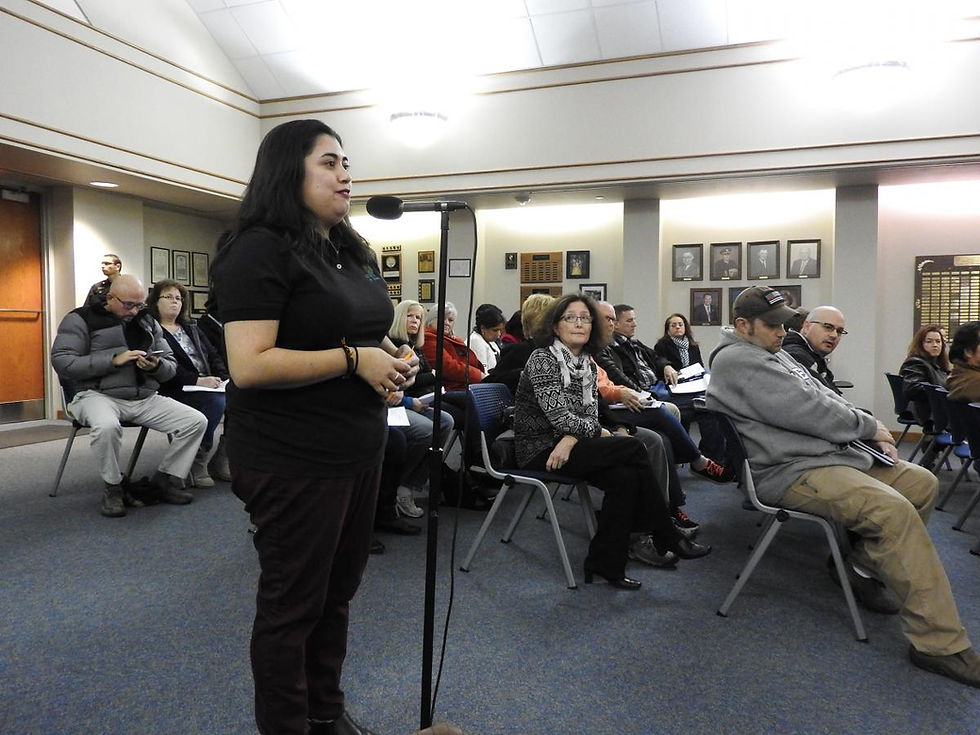Celeste Flores Testifies at Climate Crisis Committee Hearing on Environmental Justice
- Celeste Flores
- Nov 21, 2019
- 4 min read
Celeste Flores, Lake County Outreach Director, gave a version of this testimony to the Congressional EJ Committee on 11/21/19 in Washington D.C. Watch the video to hear her full remarks, and those of two other witnesses, each of whom discussed the challenges their communities are facing and their vision for national policy.
Dr. Cecilia Martinez, Co-founder and Executive Director, Center for Earth, Energy, and Democracy
Michele Roberts, National Co-Coordinator, EJ Health Alliance for Chemical Policy Reform, and EJ4All
Click the YouTube image to watch the full hearing.
Good morning. My name is Celeste Flores and I am the Lake County Outreach Director for Faith in Place and the Co-Chair for Clean Power Lake County. And on behalf of our communities, I greatly appreciate the opportunity to provide testimony today. I am the daughter of an immigrant, a proud Chicana, and a first-generation college student. I was born and raised in Lake County and I didn’t learn about environmental justice until I saw the devastation of mountaintop removal in Kentucky. And that as a person of faith, I felt morally challenged to know how my luxuries affected the lives of my brothers and sisters and of this planet. After graduation, I spent a year as an AmeriCorps volunteer in Appalachia until I finally returned home to learn about the local opportunities for environmental justice work. I began as a volunteer with Clean Power Lake County and our mission is to organize within frontline environmental justice communities to shift Lake County toward healthy, renewable energy–and to achieve self-determination for immigrant, low-income and working-class families. Like so many in my community, I was unaware that I grew up in a fenceline community and spent most of my childhood within miles of a coal-fired plant and five superfund sites. It wasn’t until my return that I became educated on the environmental injustices that existed. That was five years ago. I never imagined that when I moved back home to work at my local church, I would become an expert on particulate matter, coal plants, the PJM grade capacity market, coal ash, Superfund sites, Ethylene Oxide, let alone to organize a whole community to demand our basic right to breathe clean air, drink clean water, and have a healthy land.

Waukegan is predominantly a Latino/x, African-American, low-income, working-class community. The town was once booming with the economy. Once these polluting corporations were no longer profitable, they abruptly left and took all their resources and polluted our land, our air, and our water, leaving the community economically devastated and polluted.
Now it’s up to us to clean it all up. And we’re still dealing with that pollution.
Waukegan is not the only EJ community left behind by industry. Take Zion, IL as another example. This is an EJ community that was booming until the nuclear plant was no longer online, which occurred more than 20 years ago.
As a child in the summer, my family did not go to the Waukegan beach because if you did not have a resident sticker there was a charge to visit the beach but if we drove 10 minutes north, you arrived at IL Beach State Park, which was free. I spent many summer days swimming in Zion, IL, unaware of the nuclear plant hundreds of feet from the beach area. I am sure I asked an adult in my life what was the building I could see while I swam. My educated guess would be that I was told the building was a part of the state beach.
This is what companies are relying on: that communities don’t ask questions and they’re making a profit on the most vulnerable communities and keeping us in the dark.

When I first learned about the coal plant, I would ask everyone if they knew that there was a coal plant in our community. Some thought, growing up they were told it was a cloud factory. Others thought it was clean now because there was no gray dust on our cars when we woke up in the morning. Others thought we had to have this coal plant in order to have energy. These are all false notions that the industry has created to help continue gaining off our communities. The company, NRG Energy, which owns the coal plant on our lakefront even hired a former city employee to be their lobbyist. Environmental justice communities like Waukegan deal with a lot of cumulative impacts, which you’ve already heard [from the other witnesses]. This is what we’re asking. We’re asking for the Senators to be able to sit with us as environmental justice community leaders and think about how we are going to be addressing our concerns and problems holistically and not in silos. We need you to hold other federal agencies like the EPA accountable to the Principles of EJ and the Jemez Principles of Democratic Organizing. Use your current privilege to fight to center the frontline leadership voices in conversations. This will not be easy. It will require a continuous process of trial and error as we each learn to lead and to follow. It will take time to get it right, and we may experience anger and frustration along the way. Nevertheless, it is crucial that we start this journey in solidarity with one another, rooted in our love of our communities.
Thank you for your time.








